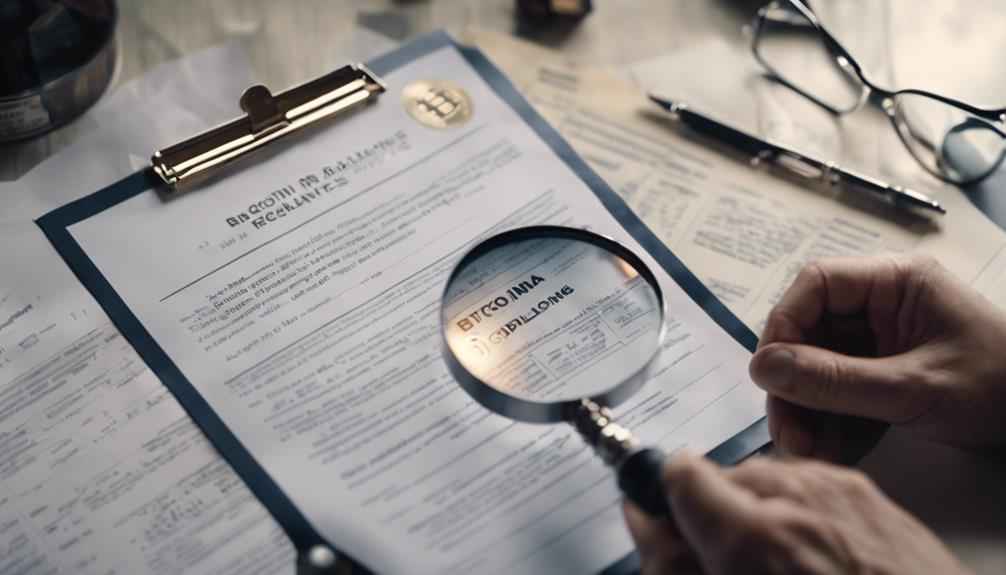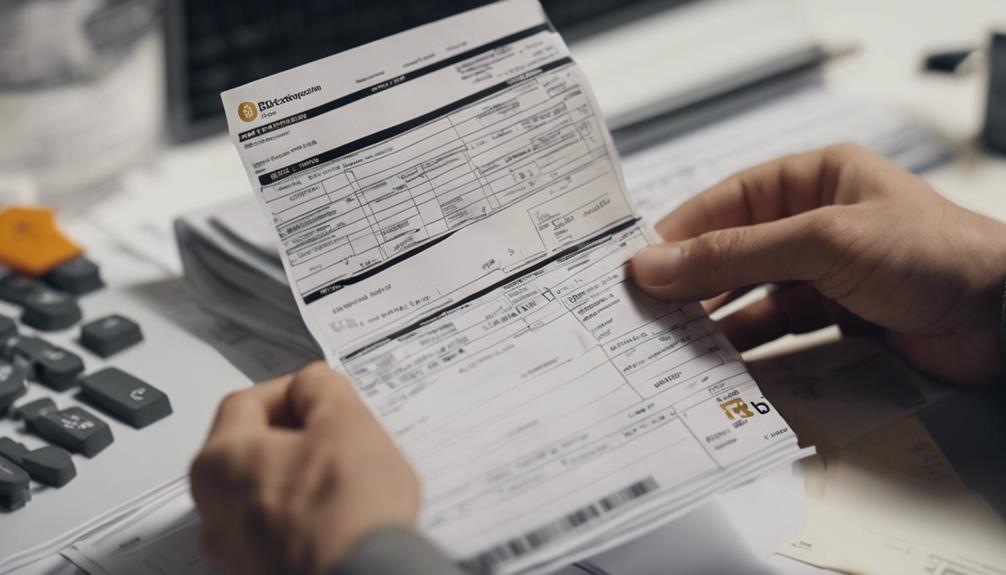To comply with Bitcoin IRA regulations, it is important to understand that the IRS considers cryptocurrencies as property. It is essential to follow IRS and SEC guidelines, including capital gains tax on Bitcoin IRA gains and losses. Make sure to choose IRA custodians who comply with IRS regulations. Keeping thorough records and accurately reporting are crucial for IRS compliance. Having secure custody chain documentation and reputable custodians can enhance both compliance and security. Utilize secure storage solutions like cold storage for Bitcoin in IRAs. Stay informed about evolving regulatory guidelines and seek advice from tax professionals for tax optimization. Plan for tax efficiency by selecting the right IRA and trusted providers. For further information on Bitcoin IRA regulations, it is recommended to explore strategic strategies.
Key Takeaways
- Understand IRS treatment of cryptocurrencies as property in Bitcoin IRAs.
- Ensure compliance with IRS and SEC regulations for cryptocurrency investments.
- Choose reputable IRA providers to meet regulatory requirements.
- Maintain accurate transaction records for IRS reporting and compliance.
- Implement secure storage solutions like cold wallets for Bitcoin IRA management.
Regulatory Landscape for Bitcoin IRAs

Understanding the regulatory landscape for Bitcoin IRAs involves grasping how the IRS treats cryptocurrencies as property for tax purposes. When it comes to retirement accounts, including self-directed individual retirement accounts (SDIRAs), investors must adhere to IRS rules regarding cryptocurrency investments. The IRS considers cryptocurrencies held within IRAs as property for tax purposes, meaning that any gains or losses incurred from these investments are subject to taxation at applicable capital gains rates. Additionally, IRA custodians play an essential role in ensuring compliance with IRS regulations and reporting requirements.
Moreover, the regulatory landscape for Bitcoin IRAs also involves the Securities and Exchange Commission (SEC) monitoring the cryptocurrency market to guarantee compliance with securities laws. Despite the complexities involved, Bitcoin IRAs offer tax benefits similar to regular IRAs, with withdrawals being subject to ordinary income tax rates. By staying informed about the regulatory environment and working closely with reputable IRA custodians, investors can navigate the evolving landscape of cryptocurrency investments within retirement accounts effectively.
Tax Considerations for Bitcoin IRAs

Given the IRS's classification of Bitcoin investments within IRAs as property for tax purposes and the implications of gains or losses on taxation, understanding the tax considerations for Bitcoin IRAs is essential for maximizing potential benefits and complying with regulatory requirements.
When maneuvering the tax landscape of Bitcoin IRAs, consider the following points:
- Tax Advantages: Bitcoin IRAs can offer tax benefits through strategies such as tax-deferred growth or tax-free withdrawals.
- Capital Gains: Gains or losses from Bitcoin investments in IRAs are subject to taxation at applicable capital gains rates.
- Roth Bitcoin IRAs: These accounts allow for tax-free withdrawals under specific conditions, influencing overall tax implications.
- Traditional IRA: Withdrawals from Traditional Bitcoin IRAs are typically taxed at ordinary income tax rates.
- Consultation: Seeking guidance from a tax professional or Bitcoin IRA provider can help optimize tax deductions and compliance with IRS regulations.
Understanding the tax implications of Bitcoin IRAs can aid in making informed decisions regarding retirement planning and investment strategies.
Compliance Guidelines for Bitcoin IRAs

Understanding and complying with the regulatory landscape for Bitcoin IRAs requires strict adherence to compliance guidelines established by the IRS, SEC, and other regulatory bodies. The IRS regulations treat cryptocurrencies as property for tax purposes within Bitcoin IRAs, necessitating custodians to follow specific guidelines. Additionally, compliance with SEC regulations is essential to guarantee adherence to securities laws governing Bitcoin IRAs. Choosing a reputable IRA provider is fundamental in meeting regulatory requirements for Bitcoin IRAs. To further understand the compliance guidelines for Bitcoin IRAs, refer to the table below:
| Aspect | Description | Importance |
|---|---|---|
| IRS Regulations | Cryptocurrencies treated as property for tax purposes within Bitcoin IRAs | High |
| Custodian Guidelines | Custodians must adhere to regulatory guidelines set by the IRS for Bitcoin IRAs | Medium |
| SEC Compliance | Vital to comply with securities laws overseen by the SEC for Bitcoin IRAs | High |
Reporting Requirements for Bitcoin IRAs

Reporting gains and losses accurately is a fundamental requirement for individuals with Bitcoin IRAs to guarantee compliance with IRS regulations. When it comes to Bitcoin IRAs, reporting gains and losses is essential for tax purposes. The IRS treats cryptocurrencies held in IRAs as property, making them subject to capital gains tax.
To ensure compliance and avoid penalties, accurate reporting of transactions within a Bitcoin IRA is necessary. Failure to report these transactions can lead to legal consequences. Properly documenting and reporting all activities related to a Bitcoin IRA is paramount for maintaining compliance with tax laws.
- Reporting gains and losses accurately
- Tax purposes for Bitcoin IRAs
- Cryptocurrencies treated as property
- Capital gains tax implications
- Importance of transaction reporting for compliance
Custody Chain Best Practices

Effective management of the custody chain is essential for ensuring the security and compliance of cryptocurrency transactions within a Bitcoin IRA. Maintaining a clear custody chain involves securely documenting all movements of cryptocurrencies within the IRA.
To adhere to IRA regulations and guarantee tax compliance, it is imperative to use reputable custodians and safeguard crypto assets effectively. Custody chain documentation plays a significant role in proving ownership and demonstrating tax compliance during audits.
By following best practices in custody chain management, investors can enhance transparency, security, and accountability in handling cryptocurrency assets held in an IRA. These practices not only legitimize crypto holdings but also provide a clear record of transactions for regulatory purposes.
Implementing robust custody chain protocols is key to maintaining the integrity of the IRA investment and safeguarding against potential risks associated with cryptocurrency investments. Prioritizing security, compliance, and documentation within the custody chain is fundamental for a successful Bitcoin IRA investment strategy.
Transaction Recordkeeping Essentials

Ensuring meticulous documentation of all cryptocurrency transactions within a Bitcoin IRA is essential for maintaining compliance with IRS regulations and tax reporting requirements. Detailed transaction records play an important role in tracking cost basis, capital gains, and losses, ultimately aiding in accurate financial reporting.
Importance of Documentation
Maintaining meticulous transaction records is essential for guaranteeing IRS compliance when managing Bitcoin within an IRA. Proper documentation is key in meeting regulatory requirements and simplifying the audit process.
Here are five vital points highlighting the importance of documentation:
- Detailed Records: Dates, amounts, counterparties, and wallet addresses should be recorded for all Bitcoin transactions.
- Tax Reporting: Accurate recordkeeping aids in calculating gains or losses for tax reporting purposes related to Bitcoin held in an IRA.
- Transparency and Accountability: Proper documentation ensures transparency and accountability when adhering to regulatory requirements for Bitcoin investments in IRAs.
- Compliance Assurance: Organized transaction records can demonstrate compliance with IRS regulations for Bitcoin IRAs.
- Audit Readiness: Well-maintained documentation can streamline the audit process, facilitating a smoother review of Bitcoin IRA transactions.
Compliance With Regulations
To adhere to Bitcoin IRA regulations, meticulous transaction recordkeeping is imperative to guarantee accurate reporting to the IRS. Essential transaction records encompass details such as purchase dates, amounts, prices, and wallet addresses for all cryptocurrency transactions within the IRA. This level of detailed recordkeeping is essential for tracking gains, losses, and holding periods of cryptocurrencies held in the Bitcoin IRA.
Accurate transaction records play a pivotal role in tax reporting and ensuring compliance with IRS guidelines regarding cryptocurrency investments within IRAs. Maintaining these records is not just a good practice but a necessary step to demonstrate the legitimacy and transparency of Bitcoin IRA holdings in the event of IRS audits or inquiries.
Secure Methods for Bitcoin IRA Management

When managing a Bitcoin IRA, it is essential to prioritize security by employing reputable custodians with robust security measures in place. Utilizing secure methods for Bitcoin IRA management is vital to safeguard your investments. Consider the following strategies: When choosing a provider, ensure they offer multi-signature wallets and cold storage solutions, as these are critical for protecting your assets from potential cyber threats. Regularly monitoring your account and staying informed about the latest security practices can also help mitigate risks. Taking these steps will help you effectively secure your Bitcoin IRA and provide added peace of mind for your financial future.
- Implement cold storage solutions or hardware wallets for offline storage of Bitcoin in your IRA.
- Utilize multi-signature wallets to add an extra layer of protection against unauthorized access to your Bitcoin holdings.
- Regularly update security protocols and conduct audits of your Bitcoin IRA holdings to prevent security breaches.
- Employ strong authentication measures, such as two-factor authentication, to enhance the security of access to your Bitcoin holdings.
Evolving Regulatory Guidelines

As the regulatory landscape changes, compliance requirements for Bitcoin IRAs are continuously updated to align with IRS and SEC guidelines. Understanding these updates is crucial for investors to guarantee adherence to the evolving regulatory frameworks.
Keeping abreast of these changes will help investors navigate the complex world of Bitcoin IRA investments with confidence and compliance.
Regulatory Landscape Changes
Evolving regulatory guidelines in the domain of Bitcoin IRAs reflect a dynamic landscape shaped by updates from government agencies such as the IRS and SEC. These changes aim to provide clarity on taxation and compliance requirements for cryptocurrency investments within retirement accounts. Investors must adapt to the evolving regulatory framework to effectively manage their Bitcoin holdings in IRAs. Understanding these guidelines is essential for maneuvering the complex landscape of Bitcoin IRA regulations.
Changes in regulatory frameworks
Clarity on taxation and compliance requirements
Impact on managing Bitcoin holdings in IRAs
Importance of understanding evolving guidelines
Necessity for compliance with updated regulations
Compliance Requirements Update
The latest updates in regulatory guidelines for Bitcoin IRAs reflect a proactive response to the expanding cryptocurrency market, guaranteeing enhanced investor protection and regulatory oversight within the industry.
These compliance requirements focus on establishing clear rules for custodians, investors, and other stakeholders involved in Bitcoin IRAs.
The evolving regulations are designed to address concerns surrounding security, transparency, and compliance within the Bitcoin IRA industry.
It is essential for investors to stay informed about the changing compliance requirements to navigate Bitcoin IRAs effectively and securely.
Sound Strategies for IRA Bitcoin Management

Employing robust strategies for managing Bitcoin within an IRA is essential to guarantee adherence to regulatory frameworks and maximize investment potential. When it comes to Bitcoin IRAs, there are several sound strategies that can help individuals navigate the complex landscape of regulations and tax laws effectively:
- Maintain Compliance: Stay updated on IRS regulations and make sure all transactions within the Bitcoin IRA comply with tax laws.
- Proper Documentation: Keep thorough records of all Bitcoin transactions and holdings within the IRA for transparency and auditing purposes.
- Consult Tax Professionals: Seek guidance from tax professionals experienced in cryptocurrency investments to ensure proper compliance.
- Secure Storage Solutions: Implement secure storage options, such as hardware wallets or reputable custodians, to protect Bitcoin holdings from potential security threats.
- Regular Review: Periodically review and adjust your Bitcoin IRA strategy in line with any regulatory changes or investment goals to optimize your retirement savings.
Tax Efficiency in Cryptocurrency Investments

Enhancing tax efficiency is paramount when considering cryptocurrency investments within an IRA. By choosing a Roth IRA, investors can benefit from tax-free growth and tax-free withdrawals under specific conditions.
In contrast, holding Bitcoin in a Traditional IRA may result in withdrawals being subject to ordinary income tax rates upon reaching retirement age. Opting for a Roth Bitcoin IRA can potentially offer long-term tax advantages for those holding cryptocurrencies.
Understanding that gains or losses from crypto investments within IRAs are treated as property by the IRS underscores the need to consult a tax professional for maximizing tax efficiency and benefits.
When dealing with cryptocurrency investments, working with reputable IRA providers and utilizing secure cryptocurrency exchanges can help streamline the process while ensuring compliance with IRS regulations.
Being mindful of tax implications and seeking expert advice can greatly impact the overall success of cryptocurrency investments within an IRA.
Frequently Asked Questions
How Does the Bitcoin IRA Work?
A Bitcoin IRA functions as a retirement account designed for investing in cryptocurrencies like Bitcoin. It operates similarly to a traditional IRA, allowing individuals to purchase and hold digital assets within a tax-advantaged structure. By providing exposure to the cryptocurrency market, Bitcoin IRAs offer diversification benefits.
Custodians and secure storage solutions are essential to securely and compliantly manage Bitcoin IRAs, ensuring the protection of assets within the retirement account.
How to Hold Bitcoin in Ira?
To hold Bitcoin in an IRA, individuals must work with a self-directed IRA provider that permits cryptocurrency investments. The custodian of the IRA manages the purchase and secure storage of Bitcoin.
What Is the Limit for Bitcoin Ira?
The limit for Bitcoin IRA contributions mirrors traditional IRAs, currently capped at $6,000 annually for individuals under 50 and $7,000 for those aged 50 and above. These limits extend to all IRA investments, including Bitcoin, ensuring IRS compliance. Exceeding these boundaries may result in penalties and jeopardize tax advantages.
Given the potential for adjustments based on IRS regulations and retirement account modifications, staying abreast of contribution limits is crucial for effective management of Bitcoin IRAs.
Can I Withdraw Bitcoin From Bitcoin Ira?
Yes, you can withdraw Bitcoin from your Bitcoin IRA. Withdrawals are subject to specific conditions, such as standard market hours and liquidity constraints. Bitcoin IRA providers have set processes and requirements for withdrawals.
The IRS treats Bitcoin in an IRA as property, making withdrawals subject to applicable capital gains tax rates. Consult with your Bitcoin IRA custodian to understand the withdrawal process and any associated tax implications.
Conclusion
In summary, maneuvering the regulations surrounding Bitcoin IRAs requires careful attention to compliance guidelines, reporting requirements, and custody chain best practices. By staying informed on evolving regulatory guidelines and implementing secure methods for management, investors can effectively manage their Bitcoin IRAs.
It is essential to take into account tax efficiency and sound strategies for IRA Bitcoin management to guarantee a successful retirement investment plan. Stay diligent and informed to navigate the complex world of cryptocurrency investments.










